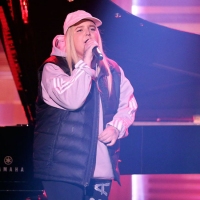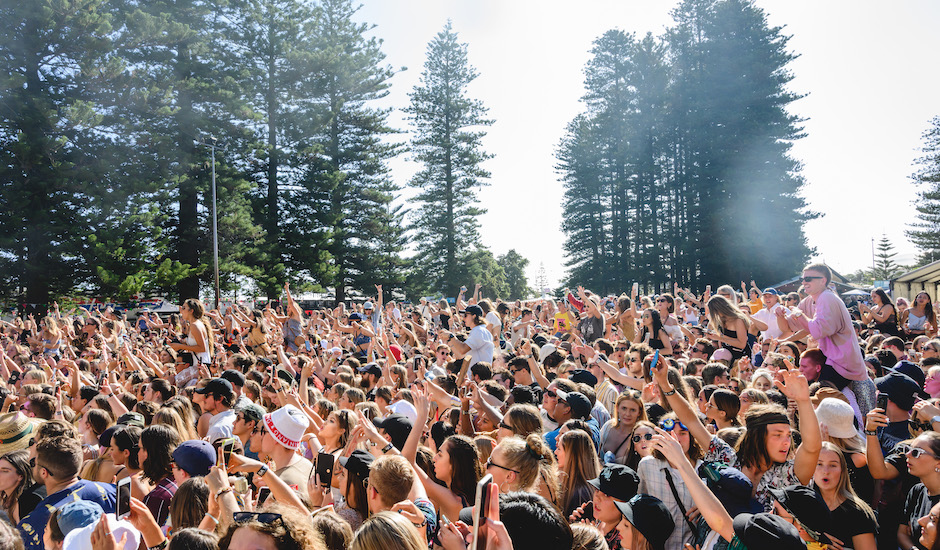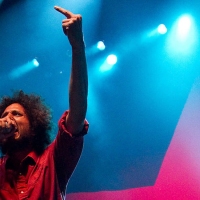 Tones And I & Tall Poppy: Celebrating Australia's biggest success in a decadeFor the first time since Gotye, one of the biggest musicians in the world is Australian. It’s a shame that people don’t want to celebrate that.
Tones And I & Tall Poppy: Celebrating Australia's biggest success in a decadeFor the first time since Gotye, one of the biggest musicians in the world is Australian. It’s a shame that people don’t want to celebrate that.

Coronavirus is killing music festivals – will they ever recover?
In the last few months, it’s become clear that 2020 will be grim for live music. Music festivals, however, may never recover.
Header image by Liam Fawell.
Reading a list of the world’s biggest music festivals now feels alike to reading an actual obituary. Over the last six months, the world has quickly grappled at the severity of the coronavirus (COVID-19) pandemic, which in the space of a few weeks, quickly went from a pub discussion filled with laughs (“oi, what’s with this boomers buying toilet paper?!”) to something far more serious, with international deaths tipping millions as virus hotspots make themselves known in the US, Brazil and India. Even in Australia – a place that has near-wiped coronavirus and missed the brunt of the virus’ first wave – it’s clear that this is going to be a time constantly referenced in history books.
In Australia, much of the last few months has felt like the government playing catch-up. Our country’s harsh lockdowns – the very same ones which allowed us to dodge much of the virus and should never be debated as ‘being too much’ as a result – ripped much of the economy to shreds, with industries in media particularly hard hit, as evident through the publicised, rapid shut-downs of news platforms regional and metro, and digital and print. The government has acted quickly to save the bulk of people’s work – changes to Job Seeker and the introduction of Job Keeper was a lifeline to many that shouldn’t be reversed – but industries to slipped through the cracks, either through loopholes and special circumstances that jeopardise their survival through this time.
One of them – as you’ve probably heard – is music. To those outside the industry, coronavirus’ impact on music may have been missed. Initially, albums and singles were postponed a few weeks in hope that it would all blow over, but when labels worked out that wouldn’t happen for at least months, release dates were brought forward again. We had albums from big-name popstars to local indie bands alike, and in many ways, it seems like the industry is thriving. In the US, for example, there have been artists top the Billboard Singles Chart this year – 14 – than there has been in many years throughout the last two decades, which is a feat considering we’re only halfway through the year.
Deep down, however, the industry is dying. For any artist and the teams behind them, touring is their most lucrative income source – festivals, headline tours, support tours alike. For much of this year – and much of the remaining year, most likely – touring is near-none, meaning music revenue for artists and their teams solely come from sales, brand partnerships and streaming, a.k.a. close to nothing, unless you’re a charting star. Lend a thought and prayer for booking agents and music promoters, who each lost months – potentially years – worth of work in a matter of days, now with no income stream with no shows or tours to take cuts and advances from.
Hey Moo Crew, there is nothing that we love more than seeing you in each of our regions and we are deeply saddened that this won't be happening this year. Read more here: https://t.co/pOjuhZRdkO pic.twitter.com/StvfZ4OLIO
— Groovin the Moo (@groovinthemoo) March 17, 2020
Music festivals are no different, often being a major part not just of those directly involved in them – the promoters, artists, stage crews, sound and lighting teams, marketing teams and so on – but to the communities which host them, with sites such as Byron Bay – a tourist hotspot who survive the winter months through the injection of people in town for Splendour In The Grass – losing out to the millions of dollars worth of visitors not swinging by this July with the festival’s postponing, turned cancellation this morning. Likewise, to the numerous regional communities visited by the touring Groovin the Moo festival, and the many, many others which play host to other regional festivals throughout the year.
Music festivals – and music touring full-stop – have been excluded from government actions and grants, not quite hitting the targets for tourism bonuses or cultural/art funding but instead something in between that needs its own, distinct funding. This lifeline was something being prayed for months ago, with nothing but a peep from governments either on a federal or state level, these prayers have all but dried up.
As a consequence, music festivals – in Australia especially – have been on a rollercoaster. Several festivals close to the pandemic’s peak closed shop for the year and focused on what’s ahead, with both Groovin the Moo and The Drop – two festivals central to regional live music – cancelling all or some of their 2020 events. Others, tried to push forward to be cancelled at the last minute – Perth’s own Hyperfest included – while others have postponed for later in the year, with results varying from now-cancelled (Splendour) to who-the-fuck-knows. Others, have said nothing but a peep – by now, Listen Out’s lineup would’ve usually arrived, but this year they’ve been quiet – while others move forward with large shake-ups, from new dates (Yours & Owls will no longer run in Spring, but now Summer) through to completely new lineups featuring only Australian acts to avoid international touring restrictions and bans.
Getting ready to wave goodbye to 2020 like we are? 2021 we are ready for you! We are excited to let you know that we are working towards a limited edition #fallsfestival with an All Australian lineup! Stay tuned and subscribe at https://t.co/2OTj2UoITr ✨ pic.twitter.com/sxir13qjYh
— Falls Festival (@fallsofficial) May 6, 2020
Many of these festivals, however, may not even survive. As we’ve found with the fall of Big Day Out to FOMO most recently, there’s often just one event between a festival’s continuation and cancellation, with many working in a way where they pay fees and costs through that year’s ticket sales. For FOMO, all it took was a year or two of shoddy ticket sales and sky-high performance fees for that to fall through, for example. In cases like Falls Festival – who have cancelled whole events in the past due to everything from bushfire threats to stampedes – insurance may cover costs and keep them going in years ahead, but as festivals quickly learnt, insurances don’t cover for a remarkably low-probability catastrophe like a global, unforeseen pandemic.
It’s likely that many of the smaller, particularly regional festivals without major backing will fail to recover and return next year. Some such as Hyperfest – which is presented and funded by the Perth shire in which its hosted – may be able to come back with an encouraging pitch to the government’s youth and arts sectors, but many only rely on brands such as Smirnoff for partnership campaigns, who are likely not going to be able to dive into cash reserves to continue things keeping afloat in the future.
Of course, it’s not all gloom and doom. Secret Sounds – the company which operates Splendour In The Grass and Falls Festival, amongst other things – likely have the notoriety, experience and money to come back next year and in the years ahead, but is a festival market dominated by one company a festival market worth celebrating? Absolutely not.
There are going to be changes there too. Falls Festival have already announced their plans for an all-Australian lineup in 2020/2021, and non-Secret Sounds-affiliated Laneway Festival is expected to follow suit. However, between the hundreds of names needed to fill out lineup spaces for these festivals alone, there’s likely to be a tonne of overlap or not much room for anyone else, which as we’ve seen in the past few years, quickly turns pessimistic in the eye of the ticket-buyer. Then, there’s the fact that there are likely to be no other acts for other festivals too, meaning the ones with the bountiful cash reserves and money to play with will be easy in outbidding the smaller, DIY-built festivals just as – if not more – important to the local music market as the heavyweights.
Already, promoters are scrambling to work out how they’ll come back. We’ve seen drive-in shows launch with laughable success (shoutout Casey Donovan and her car horn orchestra playing The Voice), while socially distanced, small-capacity seated shows are beginning to be announced – and we can’t see them being exciting for long. Ticket prices are going to be jacked up too, with smaller capacities meaning less tickets and thus, higher ticket prices to counteract it: “Very few venues can operate at a profit under those conditions until they can really open up over 500 capacity,” says Music Victoria chief executive Patrick Donovan.
It very quickly becomes clear that only the rich and clever will survive, and with the music industry being infamously exploitative and dirt-cheap to everyone that’s not Ariana Grande, it’s going to take a whole lot of creativity for Australian festivals to thrive ahead in the years to come.
After a great deal of consideration and with the interest of our beloved fans front and centre, we are moving our 20th Anniversary event forward to July 2021. For all ticket info including access to early 2021 tickets and refunds please head to our website https://t.co/vSESWR9zIu pic.twitter.com/IrTWeo7VvX
— SplendourintheGrass (@SITG) June 10, 2020
 Tones And I & Tall Poppy: Celebrating Australia's biggest success in a decadeFor the first time since Gotye, one of the biggest musicians in the world is Australian. It’s a shame that people don’t want to celebrate that.
Tones And I & Tall Poppy: Celebrating Australia's biggest success in a decadeFor the first time since Gotye, one of the biggest musicians in the world is Australian. It’s a shame that people don’t want to celebrate that.
 Shut up and play the hits: The myth of non-political musicFor some fans of rock acts, Blackout Tuesday dredged up some undesirable politics – the exact kind they’d been indulging for decades.
Shut up and play the hits: The myth of non-political musicFor some fans of rock acts, Blackout Tuesday dredged up some undesirable politics – the exact kind they’d been indulging for decades. 